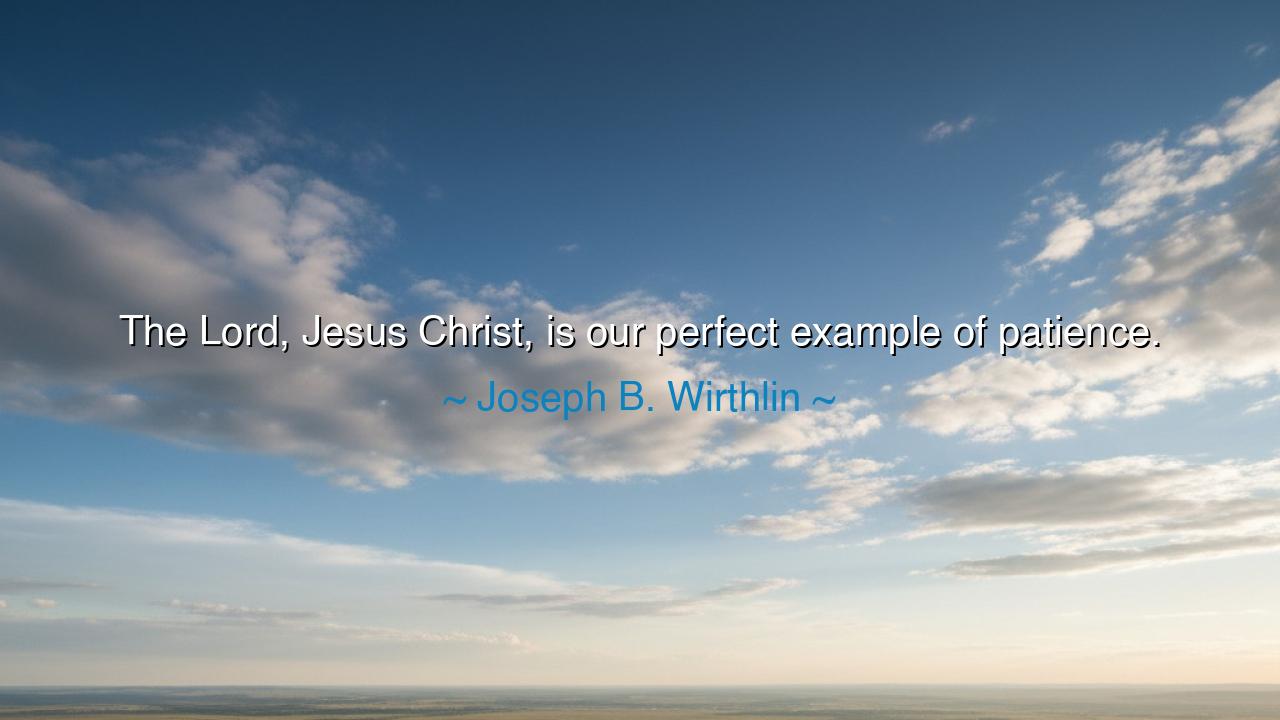
The Lord, Jesus Christ, is our perfect example of patience.






In the words of Joseph B. Wirthlin, “The Lord, Jesus Christ, is our perfect example of patience.” In this brief yet profound teaching, he lifts our eyes to the model of endurance, humility, and steadfast love shown by the Savior. Patience, in its truest form, is not simply the act of waiting; it is the soul’s ability to endure hardship with grace, to remain calm amid storms, and to extend mercy even when wronged. Christ, through His earthly ministry, His suffering, and His sacrifice, embodied this virtue without flaw, leaving behind an eternal pattern for mankind to follow.
When we speak of the origin of patience, we must remember the life of Christ: His quiet endurance as He was mocked, His refusal to retaliate when scourged, His calmness before Pilate, and His unfailing forgiveness upon the cross. Each moment was not weakness but divine strength clothed in gentleness. Wirthlin, a leader in The Church of Jesus Christ of Latter-day Saints, drew upon this sacred example to remind the faithful that the true measure of patience is found in the Lamb of God, who “opened not His mouth” even as He bore the sins of the world.
History is full of moments where the power of patience transformed despair into triumph. Consider the life of Mahatma Gandhi, who, inspired by teachings of Christ and ancient scriptures, practiced non-violence and endurance against the vast machinery of empire. Though he faced prison, ridicule, and hardship, his patient persistence eventually weakened the foundations of colonial rule. This mirrors the lesson of Christ’s patience: true strength is not in the sword or the shout, but in enduring faithfulness to higher principles.
In our own lives, we too are tested in the fires of impatience. A parent raising a difficult child, a worker striving under unfair circumstances, a soul waiting for healing—these are the crucibles where patience refines the heart. To recall the example of Christ is to remind ourselves that no trial is wasted if endured with dignity. His patience was not passive idleness but active trust in the Father’s will, even when the path led through agony.
Let us not mistake patience for weakness. It is a warrior’s discipline, the armor of those who walk with courage through uncertainty. When Christ bore the betrayal of Judas or the denial of Peter, He could have destroyed, yet He chose instead to withstand and forgive. This is the heroism that patience calls us to embrace—the quiet strength that outlives hatred, the calm that disarms anger, the endurance that shapes eternity.
The lesson here is clear: if we would walk in the footsteps of the Master, we must cultivate patience within our homes, our communities, and within ourselves. Let us practice listening before judging, forgiving before condemning, and waiting upon God’s timing rather than forcing our own. Small acts of patience—a kind word instead of a harsh retort, a calm breath in a moment of frustration—are the stones that build the temple of peace.
Therefore, O children of time, remember always the perfect example. When anger rises, recall the silence of Christ before His accusers. When despair weighs heavy, remember His steadfastness in Gethsemane. When wronged, remember His words: “Father, forgive them.” To follow Him is to take upon ourselves the yoke of patience, which though heavy at first, becomes light through love.
So let these words echo through generations: patience is not delay, but divine strength disguised as stillness. Let every soul practice it in the small moments of daily life, until the heart, like the Lord’s, learns to endure all things with hope and to overcome all things with love. In this way, we do not simply admire Christ—we walk as He walked, and in patience, we find both peace and eternal victory.






AAdministratorAdministrator
Welcome, honored guests. Please leave a comment, we will respond soon